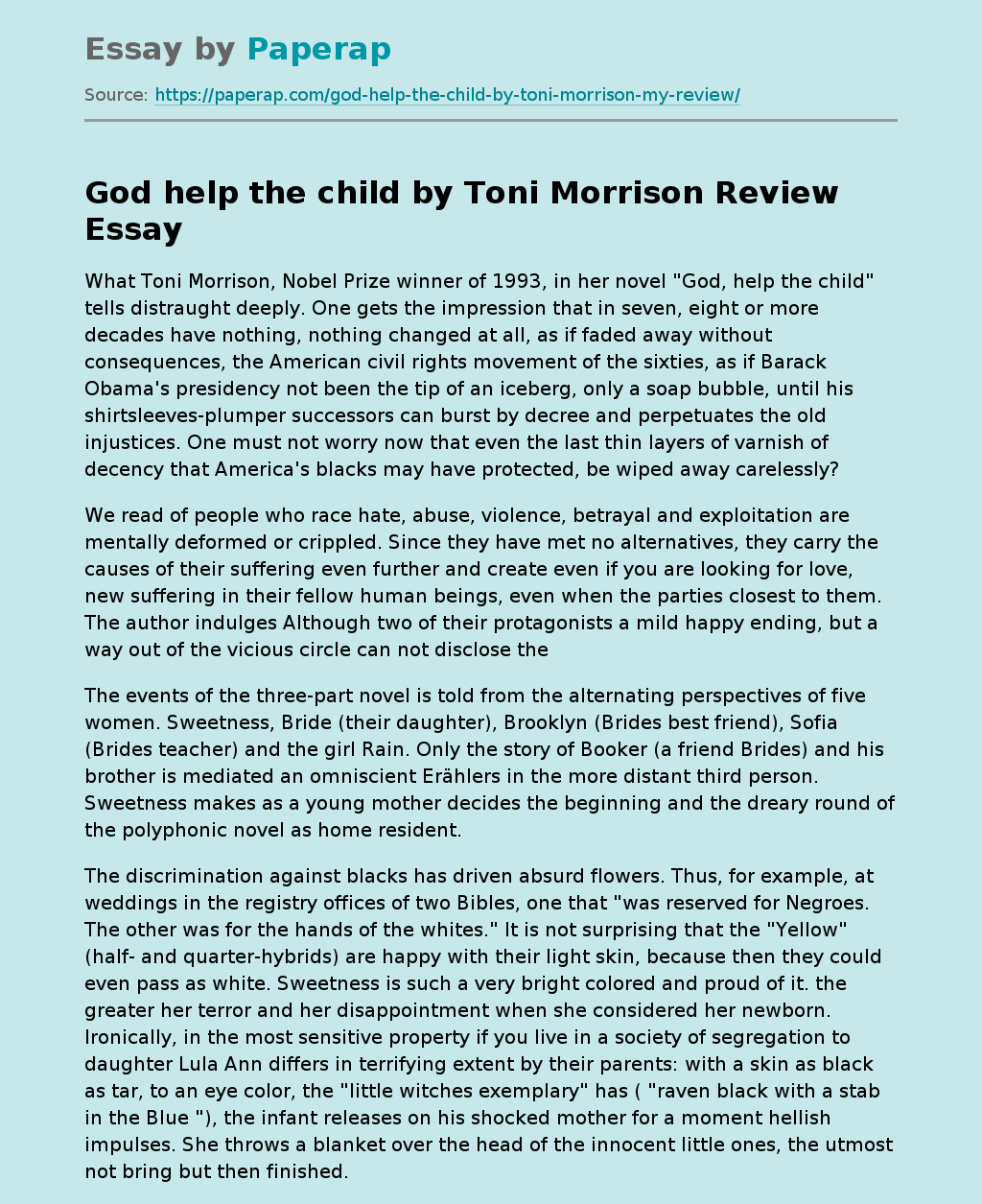God help the child by Toni Morrison Review
What Toni Morrison, Nobel Prize winner of 1993, in her novel “God, help the child” tells distraught deeply. One gets the impression that in seven, eight or more decades have nothing, nothing changed at all, as if faded away without consequences, the American civil rights movement of the sixties, as if Barack Obama’s presidency not been the tip of an iceberg, only a soap bubble, until his shirtsleeves-plumper successors can burst by decree and perpetuates the old injustices. One must not worry now that even the last thin layers of varnish of decency that America’s blacks may have protected, be wiped away carelessly?
We read of people who race hate, abuse, violence, betrayal and exploitation are mentally deformed or crippled.
Since they have met no alternatives, they carry the causes of their suffering even further and create even if you are looking for love, new suffering in their fellow human beings, even when the parties closest to them. The author indulges Although two of their protagonists a mild happy ending, but a way out of the vicious circle can not disclose the
The events of the three-part novel is told from the alternating perspectives of five women.
Sweetness, Bride (their daughter), Brooklyn (Brides best friend), Sofia (Brides teacher) and the girl Rain. Only the story of Booker (a friend Brides) and his brother is mediated an omniscient Erählers in the more distant third person. Sweetness makes as a young mother decides the beginning and the dreary round of the polyphonic novel as home resident.
The discrimination against blacks has driven absurd flowers. Thus, for example, at weddings in the registry offices of two Bibles, one that “was reserved for Negroes. The other was for the hands of the whites.” It is not surprising that the “Yellow” (half- and quarter-hybrids) are happy with their light skin, because then they could even pass as white. Sweetness is such a very bright colored and proud of it. the greater her terror and her disappointment when she considered her newborn. Ironically, in the most sensitive property if you live in a society of segregation to daughter Lula Ann differs in terrifying extent by their parents: with a skin as black as tar, to an eye color, the “little witches exemplary” has ( “raven black with a stab in the Blue “), the infant releases on his shocked mother for a moment hellish impulses. She throws a blanket over the head of the innocent little ones, the utmost not bring but then finished. The child’s father does not recognize the baby as his and settles.
Permanent coldness characterizes Lula Ann’s childhood. to satisfy the “Little Indians” on their bright chest of the young mother is repulsive. She never wants to “Mama” are called, but by her name; hiding her consanguinity. When the pretty young woman, people meet with the stroller and, in something as Sweet expecting bend over when then solidifies her face at once and the endearments for the baby they get stuck in the throat, then to at least Sweetness ( “I can not for “) remain pure.
Sweetness’ education consists solely punitive atrocities. She thinks the best of the child to act, to prepare it for his future life as discriminated against people of color. “Their color is a cross, which they always carry is”, so it is best wegzutauchen of self-protection, not only to attract attention. The girl does not fight back, taking the brutal beating as they fall. It longs for a loving physical contact and takes the powerful slaps as such out.
As young adults, but Lula Ann chooses the opposite way, the self-confident offensive. It is called Bride, contrasted her dark skin color with crisp white clothes, is stylized by the cosmetics industry to an ideal of beauty and marketed as an icon. the “Panther in the snow”, from the “cross” a rich windfall is from the “niggers”. Brides product line “You, Girl” is a success story.
Not Brides privacy. Her lover Booker she leaves. They researched it and finds out that he is severely traumatized, because his brother was abused, brutally tortured and murdered. The common stressful childhood experiences leads Booker and Bride together.
In addition to the ubiquitous racism child abuse is the second scourge in the bleak world of this book. Bookers brother is not the only victim – on the relatively few pages of this episodic densely packed novel we read or of several other, and a crime is heinous than the other. The perpetrators are mostly white, black victims. Especially sad, what a dubious roles played by women: they close their eyes, act on their own crude, heartless, aggressive and violent, and at worst hit mothers capital from the suffering of their own children
Who is to blame for. such conditions? The narrators argue and justify their actions extensively, but the multiple perspectives into perspective their views. drawn from the judiciary accountable and sentenced merely a teacher after Lula Ann has weighed heavily on trial – but how reliable is this witness? And the girl Rain forced the mother to sex services, sits with her teeth to defend. The spoils of the parent’s business, but needs the child to pay the bill yourself, because not for sale as it is, it will unceremoniously out the door set.
Although Toni Morrison maintains a concise, straightforward, everyday language related language style (translation: Thomas Piltz), the reading is not easy. The author grants us no confidence. They lined up to unbearable episodes questionable to obnoxious behavior together. Several of these plot threads are not completed and never picked up, so as staffage appear for horror theme. The people who have grown up under the described conditions beyond their influence and have to live must despair, curve their abysmal hatred against himself, aggression and violence are valves for the pressure under which they are permanent.
the excess of terror and the one-dimensionality of the company image in the reader easily lead to weariness with which the author detracts from the power of their indictment. Only the story of the beautiful, successful girls Bride who took off to regain to her lover, is a little sentimental and full of adventure. A modern fairy tale with a modern princess. But too many bitters spoil the taste of this near-happy endings
God help the child by Toni Morrison Review. (2019, Nov 18). Retrieved from https://paperap.com/god-help-the-child-by-toni-morrison-my-review/

